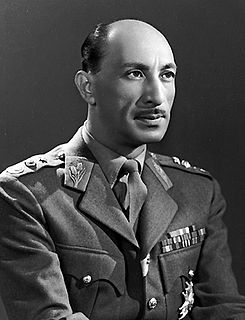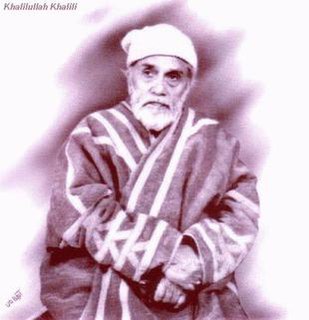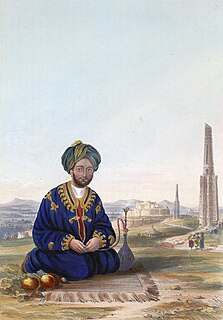Mohammad Jan Fana Safi (born 25 June 1932) is a poet, writer, and artist. He was commonly known as Mohammad Jan Fana. [1] Born in northern Afghanistan, he lived in Afghanistan's capital, Kabul, for most of his life.
Mohammad Jan Fana Safi (born 25 June 1932) is a poet, writer, and artist. He was commonly known as Mohammad Jan Fana. [1] Born in northern Afghanistan, he lived in Afghanistan's capital, Kabul, for most of his life.
He was married and had six children, three boys and three girls, who all lived in Kabul, Afghanistan but moved to the United States after Major Fana's death.
He played a number of musical instruments such as the mandolin, harmonium and accordion.
Mohammad Jan Fana Safi has 13 published books and has written countless poems. He wrote poetry in three languages: Pashto, Dari, and English.
Mohammad Jan Fana Safi has had many of his illustrations published in newspapers and magazines.

European influence in Afghanistan has been present in the country since the Victorian era, when the competing imperial powers of Britain and Russia contested for control over Afghanistan as part of the Great Game.

Mohammed Zahir Shah was the last king of Afghanistan, reigning from 8 November 1933 until he was deposed on 17 July 1973. Serving for 40 years, Zahir was the longest-serving ruler of Afghanistan since the foundation of the Durrani Empire in the 18th century. He expanded Afghanistan's diplomatic relations with many countries, including with both sides of the Cold War. In the 1950s, Zahir Shah began modernizing the country, culminating in the creation of a new constitution and a constitutional monarchy system. Demonstrating nonpartisanship, his long reign was marked by peace in the country that was lost afterwards.
The Mohmand or Momand tribe is one of the most prominent Pashtun tribes. They are descended from the 1st Son of Daulatyar and 2nd son, Daudzai, according to Pashtun historical literature. They are based primarily in the eastern districts of Nangarhar Province, Afghanistan, and the Mohmand district of the Khyber Pakhtunkhwa Province of Pakistan, bordering Nangarhar to the east.

Sibghatullah Mojaddedi was an Afghan politician, who served as Acting President after the fall of Mohammad Najibullah's government in April 1992. He was the first leader to call for armed resistance against the Soviet-backed regime in 1979 and founded the Afghan National Liberation Front at the time; later becoming a respected figure among the various Afghan mujahideen. He served as the chairman of the 2003 loya jirga that approved Afghanistan's new constitution. In 2005, he was appointed chairman of the Meshrano Jirga, upper house of the National Assembly of Afghanistan, and was reappointed as a member in 2011. He also served on the Afghan High Peace Council. Mojaddedi is considered to have been a moderate Muslim leader.

Khalilullah Khalili was Afghanistan's foremost 20th century poet as well as a noted historian, university professor, diplomat and royal confidant. He was the last of the great classical Persian poets and among the first to introduce modern Persian poetry and Nimai style to Afghanistan. He had also expertise in Khorasani style and was a follower of Farrukhi Sistani. Almost alone among Afghanistan's poets, he enjoyed a following in Iran where his selected poems have been published. His works have been praised by renowned Iranian literary figures and intellectuals. Many see him as the greatest contemporary poet of the Persian language in Afghanistan. He is also known for his major work "Hero of Khorasan", a controversial biography of Habībullāh Kalakānī, Emir of Afghanistan in 1929.

Ghulam Haidar Khan High School is an all-boys school located in Khair Khana, Kabul, Afghanistan. The school is named after Afghan Prince Ghulam Haidar Khan, son of Emir Dost Mohammad Khan, who fought against the British forces in the July 1839 Battle of Ghazni during the First Anglo-Afghan War. It has about 10,000 students from seven to twelfth grade in four shifts.

The 1989–1992 Afghan Civil War took place between the Soviet withdrawal from Afghanistan on 15 February 1989 until 27 April 1992, the day after the proclamation of the Peshawar Accords proclaiming a new interim Afghan government which was supposed to start serving on 28 April 1992.
Kabul City Center is a shopping mall in Shahr-e Naw, Kabul, Afghanistan. Opened in 2005, it consists of 100 stores and a food court. It is equipped with see-through elevators and escalators and is notable for being the first building in Kabul to be equipped with functional escalators. The building also includes the Safi Landmark Hotel, a 4-star hotel that occupies the top six of the building's ten floors. The Safi Landmark has become one of the most famous hotels in Kabul for visitors and foreigners. The building has been subject to two terrorist attacks, in 2010 and 2011. In 2013, the mall received media attention for housing an unofficial Apple Store.
Sāfī is a major branch of the greater Ghurghakhti Pashtun tribe. The Safi tribe comprises a majority in the Pech Valley of Kunar and are present in significant numbers in Parwan Province, Kapisa Province, Kabul Province, Laghman Province, Nuristan Province, and Safi-yan in Zabul Province Close to Durand line, Lead by Haji Khudai Dad Khan Safi, Haji Qalam Khan Safi and Haji Esmatullah Khan Safi. A reasonable majority also resides in different urban and rural areas of Khyber Pakhtunkhwa, particularly Peshawar, Charsadda, Mardan, Nowshehra, Swabi. A large number also settled in Rawalpindi, Tarnol, Karachi, Lahore, Multan. They are also present in large number in Mohmand, Bajaur Agency, Federally Administered Tribal Areas and in Zhob District, Balochistan, Pakistan. district {quetta} district {loralai} district {sibi}

Kohi SafiDistrict is now one major historical district located in South-eastern Parwan province, Kohi Safi district is one of the most single districts where almost all of the region is populated by Safi tribe. Although in 1930s Kohi Safi was said to be one of the 2nd most populous district of Parwan after Charakar, but during 1930s-1940s the region was depopulated due to Governments pressure to evacuation of area due to Saf's War on the King. Majority of its population were displaced or escaped further in the north away from borders of capital Kabul, few escaped to west in modern Herat and many into it India. The root of the conflict seems to be started due to King Amanuallah Khan's proposal of modernization, Safi and with few other Afghan tribes armed against the ruling family of Durrani. Although some annalists assume the other factor behind the conflict and rise of Safi was mainly due to Safi's not being of ruling Durrani tribe, but rather Shinwari. Although Majority of Shinwari's enjoyed presence of Durrani and many were often involved into Government compare to those of Ghilzai, however Safis are always known to have history of conflict with many ruling governments and empires.
Mohammad Yousef Pashtun is an Afghan technocrat and politician. He served as Minister of Urban Development and Housing for two terms and as Governor of Kandahar province in 2003, replacing Gul Agha Sherzai under President Hamid Karzai's administration. In 2010, he was appointed as Senior Adviser to President Karzai on Construction, Mines, Water & Energy. In 2014, minister Pashtun continued to serve as Senior Adviser to President Ashraf Ghani. Yِousef Pashtun is also chairing the Kabul New City Development Authority Board.

Shahla Ata was an Afghan politician, congresswoman and one of two female candidates during Afghanistan's 2009 Presidential election. She told DiManno she and her family lived for 18 years in the United States. The Contender Biography published by Pajhwok Afghan News has her living in the United States from 1990 to1 1994, and living in Pakistan for the remainder of the period 1986 to 2001, where she administered relief to other Afghan expatriates.
Turabaz Khan was a general who served in the Afghan National Army. He was born in Kabul to a Safi Pashtun family. He was educated at a military school in Kabul. He also served an associate to the Sardar Mohammad Hashim Khan (King) Mohammed Zahir Shah’s uncle and Afghanistan’s Royal Prime Minister in 1929. He also served as Kabul’s Police Commander and Chief of Security until his retirement in 1946.
General Mohammed Asif Safi was an Army General in the Afghan National Army during King Zahir Shah's rule in Afghanistan, and later during the 1970s era of President Mohammed Daoud Khan.

Ustad Mohammad Ibraheem Khwakhuzhi son of Dur Mohammad Khan Baloch was born on 28 February 1920 in Malajat district of Kandahar province, Afghanistan.
His son Gharzai Khwakhuzhi is an active politician in Afghan government and his grandson Gharanai Khwakhuzhi is an Afghan Foreign Service Officer at Ministry of Foreign Affairs of Islamic Republic of Afghanistan.
Sana Safi is an Afghan broadcast journalist, currently working for BBC World Service

The Afghan tribal revolts of 1944–1947 or the Khost disturbances were a series of tribal revolts in the Kingdom of Afghanistan by Zadran, Safi and Mangal tribesmen which lasted from February 1944 to January 1947. The causes of the revolts laid in the worsening conditions of farmers, changes in conscription laws, the elimination of the power of Safi tribal leaders, Amanullah loyalism, trading monopolies, government surveillance, taxation, and poverty. The conflict began when government forces clashed with the forces of a tribal leader named Mazrak, who led the Zadran tribe in revolt. The Zadran uprising was followed by additional uprisings by the Safi and Mangal, the former of which elected their own king, Salemai. Faqir Ipi, a tribal leader from Waziristan, also fought for the restoration of former king Amanullah Khan alongside other rebels.

Khojesta Fana Ebrahimkhel is the Ambassador Extraordinary and Plenipotentiary of Afghanistan to the Republic of Austria and as Permanent/Resident Representative to the United Nations Vienna-based organizations including CTBTO, IACA, IAEA, ICMPD, INCB, OSCE, UNIDO, UNOV/UNODC, effective 2017.

On 2 November 2020, three gunmen stormed the campus of Kabul University in Kabul, Afghanistan, killing 32 people and wounding 50 others. The attack began around the time that government officials were expected to arrive at the campus for the opening of an Iranian book fair. The three gunmen were later killed during a fight with security forces. The attack occurred at around 11:00 A.M. The Islamic State of Iraq and the Levant – Khorasan Province (ISIL-KP) claimed responsibility for the attack.